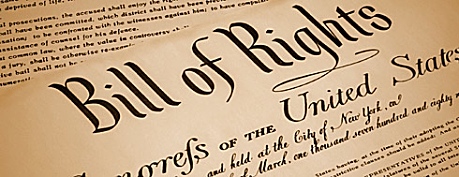Do you support First Amendment Rights? What about Second Amendment rights? Some people have favorites. They like free speech, so they support the First Amendment, but they don’t like guns, so they don’t support the Second. Someone else might support guns, so they like the Second Amendment, but they don’t think criminal suspects should have any rights, so they think the Fourth and Fifth Amendments are worthless. And so on.
If you do that, you’re confused about what rights are. It’s hard to blame you, though, because you were taught misleading information in school and you’ve grown up in a country where people don’t seem to believe you can talk about rights without finding an amendment to point to and say, “See? That’s where this right comes from.”
Contrary to what you were probably taught, the Bill of Rights doesn’t give anybody a single right. This document was simply a list of a few of the basic rights that some early U.S. politicians thought should be written down and enshrined in the Constitution to make certain that these “obvious” things were protected. But it wasn’t meant to be a complete list. The Ninth Amendment was inserted to make sure that nobody could think that this was all the rights that exist. It reads:
“The enumeration in the Constitution, of certain rights, shall not be construed to deny or disparage others retained by the people.”
In other words, “We recognize that you have all the natural rights that are yours just because you’re a human being. We’re listing a few of them here, but that doesn’t make them more special than the ones we’re not listing.”
To understand where these men were coming from, you have to understand the intellectual environment of their day and you have to look at the other things they wrote. Look at the prominent words from early in the Declaration of Independence: “We hold these truths to be self-evident, that all men are created equal, that they are endowed by their Creator with certain unalienable Rights, that among these are Life, Liberty and the pursuit of Happiness.”
These men believed that God (or nature) grants these rights to everyone. They said so very plainly. (We’ll have to overlook the fact that they were very inconsistent in the extension of those rights to everyone. They were products of their time in that regard, and we recognize today that they were wrong to accept slavery to varying degrees.) But philosophically, they believed that certain natural rights belonged to everyone. They believed that the purpose of government was merely to “secure” those rights. Whatever form of governance we agree to should be about making sure those rights are respected, not about enforcing the will of one group on another.
So when someone asks me whether I support Second Amendment rights, for instance, I’m not sure how to respond. Yes, I believe that every human being has natural rights and that includes the right to own whatever he can morally acquire — including weapons. But I don’t believe that right comes from the Second Amendment. The amendment merely recognizes that the U.S. government has no power to infringe on one particular natural right. So the right to own a gun isn’t really a “Second Amendment right.” The Second Amendment is merely a prohibition on the U.S. government stepping on that right, even though it’s regularly ignored in various ways.
You have the right to live without interference from me, just as long as you leave me alone. This seems obvious to those of us who believe in natural rights. It’s hard for me to see how people who don’t believe in natural rights can say they believe in any rights at all, because “rights” are merely the whims of whoever has political power if they’re not natural and universal.
I’m not really interested in convincing someone that natural rights exist. There are plenty of philosophers who are far more qualified to do that than I ever will be. I’m just trying to differentiate between natural rights and “constitutional rights.”
Under the current legal system in place in this country, lawyers see rights coming from the Constitution. Pragmatically, it’s good for us when those who defend a right with a line from the document are successful in courts. But I hope I never unthinkingly say or imply that our rights come from the Constitution or any amendment or any government.
If a right comes from a government document, that right can be changed at the will of whoever holds enough power. If you believe in individual liberty, a natural rights orientation is the place from which to put forward a moral position about rights, not faith in a document that is effectively dead.

 Since I’ve lost status I once had, it’s a shock to see I want it back
Since I’ve lost status I once had, it’s a shock to see I want it back